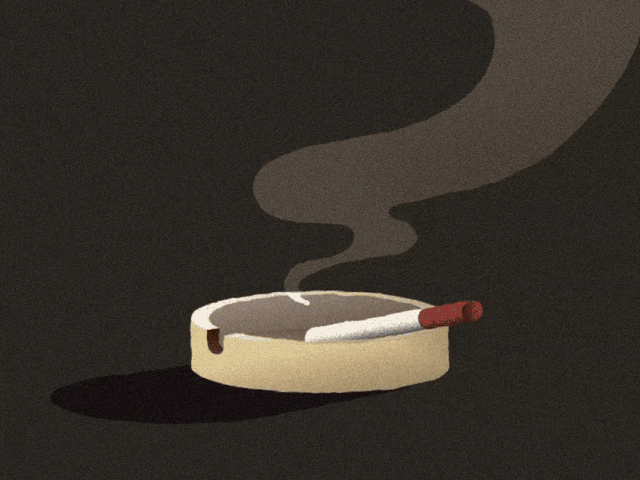This article is from: Life Times
If a string of numbers is used to quantify the consequences of “smoking”, it is probably like this:
Every 10 seconds, 1 person in the world dies from cigarettes; the death rate of smokers is 2.5 times higher than that of non-smokers; you spit out 250 kinds of poisons, including 69 kinds of carcinogens…

As the country with the most smokers in the world, behind the 316 million smokers in China , is 740 million passive smokers, they may be the smokers’ close partners, children, parents…
When persuading people around them to quit smoking, they will always be treated like this. The words choked: “Who is next door, who has smoked cigarettes all his life and lives well…” He clearly felt that something was wrong, but he didn’t know how to go back.

May 31st every year is World No Tobacco Day. “Life Times” interviewed authoritative experts to reveal the secret of “people who smoke for a lifetime”.
Experts Interviewed
< span>Xiao Dan, Director of the Tobacco Disease and Smoking Cessation Center of China-Japan Friendship Hospital
Gao Fulin, Deputy Chief Physician, Department of Ophthalmology, Special Medical Center of Strategic Support Forces
Chen Jin, Director of the Department of Respiratory Medicine, Fuxing Hospital Affiliated to Capital Medical University
Anyone who smokes a lifetime of cigarettes and still lives to 90?
“You can live to 90 after smoking your whole life” is an illusion caused by survivorship bias.
“Survivor bias” is a very classic logical fallacy. When the source of information is only from survivors, there may be a huge deviation from the actual situation.
Lao Zhang and Li smoking next door are still alive all their lives, which cannot prove that smoking is harmless; because in the world you can’t see, there are more people you don’t know Lao Wang, Lao Liu, Lao Zhao, and Lao Chen died of cancer because of smoking.
Those who “have smoked cigarettes all their lives are fine” are just survivors; those who die prematurely due to smoking become silent data.
If you have to ask “why can someone live a long life after smoking a lifetime”? The one-sentence explanation is: the victory is in the genes.
A study published in the Journal of Geriatrics by researchers at the University of California, Los Angeles showed that in the genomes of people who smoke but live longer, there are 215 single nucleotide polymorphisms.

People with this gene have a stronger ability to repair damage in their cells. That is, although they smoke, the cells in the body can better resist the corresponding damage.
The researchers also compared these “smoking but long-lived people” with 6,447 non-smokers, and found that people with these single nucleotide polymorphisms were more likely to live longer. The odds of reaching the age of 100 are more than three times that of the average non-smoker.
As an ordinary person, it is best not to think that you will be the lucky few.
Are many people still healthy after a lifetime of smoking?
The effects of tobacco (including electronic cigarettes and second-hand smoke) on people have a lag effect, sometimes even 10-30 years.
The harm of tobacco to the human body will gradually accumulate with the increase of the amount of smoking and the number of years of smoking. Higher risk of lung cancer and other related diseases.
Smoking is the leading cause of lung cancer, and 90% of lung cancers are related to smoking. Even without lung cancer, tobacco can cause other serious damage to lung function.

According to statistics, there are as many as 36 health problems related to smoking, among which ischemia Sexual heart disease, chronic obstructive pulmonary disease, lung cancer and stroke, together account for more than 70% of all deaths due to smoking.
“It is healthy to smoke for a lifetime” and “safe amount of smoking” does not exist. What we can do is to quit smoking early to minimize the risk of lung cancer and other diseases.
A puff of cigarettes hurts 8 organs at the same time
< span>Tobacco smoke contains at least 69 known carcinogens, a variety of harmful gases, and highly addictive nicotine. A single puff of cigarettes allows 7,000 chemicals to enter the body.

A large number of studies have shown that smoking and second-hand smoke can cause harm to almost all organs in the human body, including the leading cause of death in China Cardiovascular diseases, tumors and chronic respiratory diseases are the top three diseases.
brain< /strong>
Cognitive decline
People who smoke more than 20 cigarettes per day, The risk of cerebral hemorrhage is 2.84 times that of non-smokers. Long-term smoking can accelerate the thinning of the cerebral cortex and lead to cognitive decline.
Eye
damage to the cornea
Cigarettes enter the blood circulation through the respiratory system, interfere with fat metabolism in the blood, accelerate blood coagulation, reduce the oxygen content in the blood, and flow through the eyes, causing vascular embolism and increased permeability in the eyes. p>
In addition, the aerosols produced by smoking can also cause dry eye, cataract, uveitis, age-related macular degeneration and other eye diseases.
teeth
falling out< /p>
People who smoke regularly have a significantly increased risk of tooth loss. Compared with non-smokers, male smokers have a 3.6 times higher risk of tooth loss, and female smokers have a 2.5 times higher risk of tooth loss.
lungs
Significant decrease in function
The inflammation and oxidative stress caused by smoking can cause inflammatory damage, degeneration and necrosis of airway mucosa, and damage the cells bronchial, causing obstruction of small airways, thereby significantly reducing lung function, leading to chronic bronchitis, asthma and chronic obstructive pulmonary disease.
heart
High risk of myocardial infarction
The risk of myocardial infarction is 3 times higher in smokers, and female smokers have an additional 25% risk of heart disease.
Liver
Stimulate hepatitis virus
Smoking can stimulate the activity of chronic hepatitis C virus, making chronic hepatitis more likely to develop into severe hepatitis.
Stomach
Mucosal damage
The nicotine in tobacco makes the submucosal blood vessels constrict and spasm, causing mucosal ischemia and hypoxia, thereby destroying the integrity of the gastric mucosa sex. At the same time, nicotine, nicotine, etc. will also enter the saliva, causing gastric ulcers.
Vascular
Lesions and obstruction
Smoking will further constrict and spasm blood vessels, further increase blood viscosity, increase major blood vessel and microvascular lesions, and eventually lead to large blood vessels Large and small blood vessels are blocked, causing tissue ischemia and hypoxia.
Stop smoking for 1 year, 10 years, 15 years…
Some smokers may fall into a misunderstanding, thinking that since they have been smoking for a long time and their lung function is damaged, they should simply stop smoking.
In fact, smoking is the number one controllable factor among the leading causes of death globally. The sooner you quit smoking and the longer you quit smoking, the greater the health benefits for yourself and your family.

- Quit after 3 months: Lungs Function, reproductive health and fertility can be improved;
- six months after quitting smoking: shortness of breath and cough symptoms will be significantly reduced;
- 1 year after quitting: 50% lower risk of death from myocardial infarction;
- Quitting10 Years later: Lung cancer risk decreased by 50%;
- smoking cessation after 15 years: risk of all-cause mortality reduced to that of non-smokers same.
4 out of every 5 smokers try to quit, mostly unsuccessfully. For tobacco-dependent patients, smoking cessation clinics can help improve the success rate of smoking cessation.
How to Improve Your Quit Success Rate
There is sufficient scientific evidence to show that smoking cessation drugs can relieve withdrawal symptoms and help smokers who are willing to quit smoking to improve the success rate of smoking cessation.
At present, there are three types of first-line smoking cessation drugs in China: nicotine replacement therapy (NRT) drugs (including nicotine chewing gum, nicotine patches, etc.) ), bupropion hydrochloride extended-release tablets and varenicline tartrate.
It should be noted that each smoking cessation drug has contraindications or needs to be used with caution, and should be used safely under the guidance of a professional doctor .
Once you start quitting smoking, do it completely. If you encounter difficulties in the process of smoking cessation, such as withdrawal reactions or drug-related reactions to smoking cessation, you must go to the smoking cessation clinic in time to seek professional smoking cessation guidance and treatment; you can also call the national professional smoking cessation hotline 400-808-5531, Get help quitting smoking. ▲
Editor of this issue: Liu Yunzhen